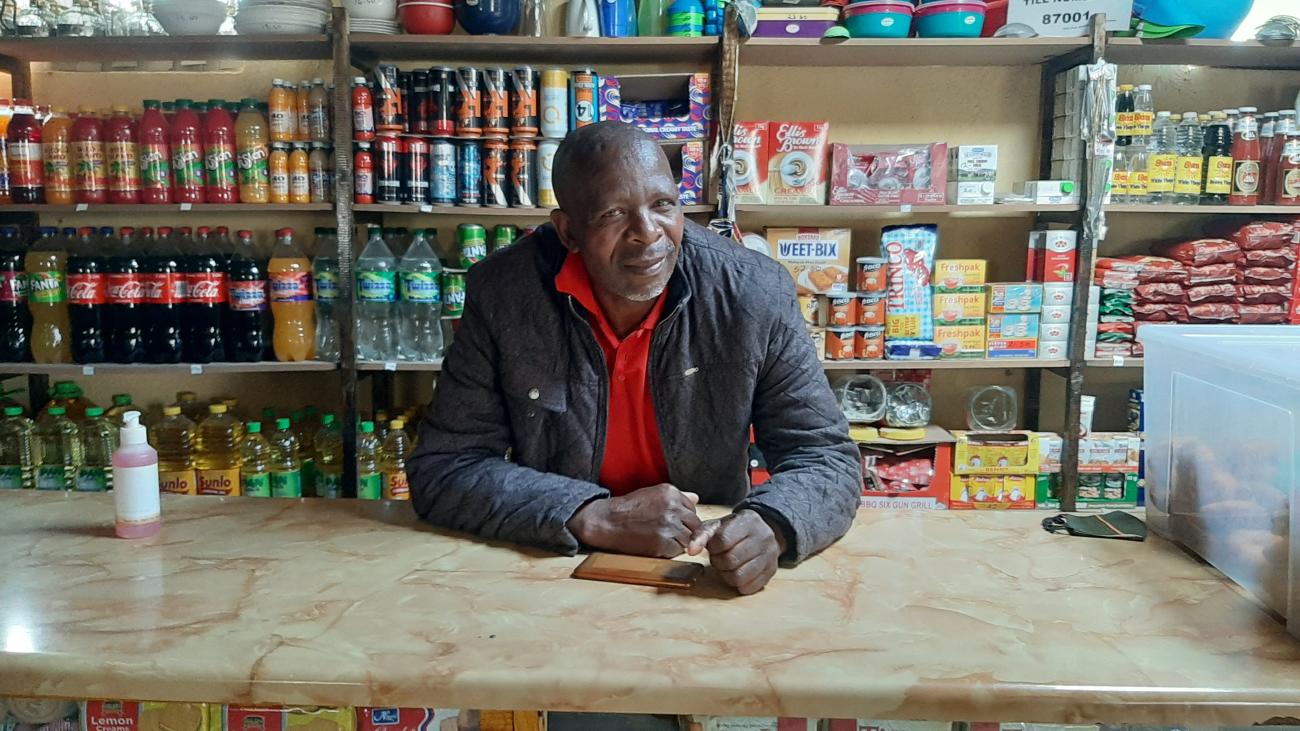Bringing business back to Lesotho

How small local shops can be tools to fight hunger.
COVID-19 has disrupted the lives of everyone around the world and small businesses are no exception. Lekoane Busa, a small grocery retailer and farmer in Lesotho, would know. He has been running Tsau-Tsau General Dealer since 1963 — the shop enabled him to send his eight children to school. But this year is different.
“Business has not been the same since the pandemic began,” says Busa. “Many of our customers have lost their jobs so they are spending less, and as a result, we are making less too.”
Lesotho, a country landlocked by South Africa, was already facing a food security crisis due to consequences from the El-Niño-induced drought. Crop failures, limited stock, low incomes and high food prices have all been exacerbated by the pandemic.
Busa is among approximately 80 percent of the country’s population who live in rural areas where retailers have been hit by the economic impact of measures to control the pandemic.
World Food Programme (WFP) representatives first approached Busa in 2018 to establish a partnership. “They told me they have an operation to feed vulnerable children and that they wanted to partner with local retailers,” he says. “As a farmer, it had always been my wish to give back once I became successful. This was the first time I could achieve that dream.”
Busa joined a network of local retailers to assist over 40,000 orphans and vulnerable children facing malnutrition. Drought drove that number to nearly 120,000 people receiving cash-based assistance.
But Lekoane faced a common sourcing challenge for small local businesses. Lesotho Flour Mills required retailers order a minimum of 10 metric tons of flour for delivery. Lekoane could not afford to purchase this bulk quantity for his small shop which serves 144 WFP beneficiaries. He faced staggering costs to purchase and transport flour on his own with wholesalers instead.
Traditionally, WFP may have stepped in with direct distributions of flour. But in an effort to enhance resilience and build long-term sustainability, WFP introduced a buying club in Lesotho which connects small retailers to aggregate their buying with larger wholesalers. This new tool is used to increase local market efficiency and has been tested in other countries too, including refugee camps in Kenya. Through local collaboration in these countries, WFP food assistance can be delivered sustainably by the community to the community.
Lesotho Flour Mills agreed to allow small retailers to procure flour directly from them, a move that could attract customers, making it easier for independent businesses to buy locally, boosting the economy.
WFP connected 25 small partner shops into a group to buy from the Mill. By purchasing in bulk, the retailers could easily reach 10 metric tons of flour, gaining more for less from savings sharing the purchase and transport costs. Together, they also gained more negotiating power.
“WFP brought unity among us retailers,” says Busa. “Before … we were just retailers that minded their own businesses. But now we work together as one.”
With savings from the buying club, Busa renovated his shop and bought new stock such as clothing, in addition to the rice, dairy, and other groceries he sells. His success trickled down to more savings and products for his customers — many customers are vulnerable members of the community and people who receive support from WFP.
“My business was transformed,” he says. “More often, I’ve been told that my shop looks like the shops in the urban areas.”
Busa could finally afford to give back to his community as he always hoped to. He and 13 retailers from the buying club prepared and distributed food parcels to people in their villages impacted most by the declining economic conditions, reaching a total of 26 families. The parcels included maize, flour, sugar, and soap and cleaning detergents to help curb the spread of COVID-19
“Giving back to the community was our way of honouring WFP’s initiative that brought our businesses back to life,” says Busa. “I hope one day, with the little I have, I could be counted among the donors in my country.”
Today, WFP no longer directly facilitates the buying club. Yet, Busa and the other retailers continue to buy in a group from Lesotho Flour Mills, proving to be a sustainable solution for hunger that can remain, even when WFP steps out. And while the country will likely continue to face drought and difficult measures to control the pandemic, local businesses and supply chains are more prepared now to face their economic implications, together.





